
by Siraj Institute | Nov 21, 2024 | Article
The double digit countdown to Ramadan begins today. It is the perfect time to start preparing spiritually, mentally, and physically. Here are five meaningful ways to make this Ramadan better than ever before:
1. Start fasting
No one wants to start Ramadan with headaches or interrupted routines. Begin fasting at least Mondays and Thursdays every week.
Also, if you have any days to make up, start right away. The days are already short and easy, do not procrastinate!
2. Pre-commit
Remember the times of weakness you had last Ramadan? Allah heard you when you said to yourself “next Ramadan I shall do better, in sha Allah.” Now it’s time you act on those words and mentally commit early on to prepare better than you did before.
3. Learn and Grow
Whether it’s the wish to understand the Quran deeper, or just get a grasp of what those beautiful verses mean when you’re in taraweeh, we all need better knowledge in order to do better worship.
Although our registration deadline ended on October 30th, we have decided to reopen it to new students seeking the benefit (previous classes were recorded, don’t worry). Consider joining one of our ongoing classes to deepen your understanding and connection with your faith. We offer a variety of courses by some of the highest calibre instructors in the city:
– Arabic as a Second Language (Levels 1, 2, and 3)
– Analytical Tafseer
– Introduction to Fiqh
– Aqeedah I
– Meccan Seerah
Did you know? At Siraj Institute, you can study in person or online with us. All our classes are bimodal. Financial aid is available, with priority to in person students.
4. Supercharge your faith
Embark on spiritual journey of Umrah before or during Ramadan. Going to Mecca will help you calibrate your compass, charge you with Iman, and prepare you to return home with better worship and daily habits.
The Messenger of God said: “Performing Umrah in Ramadan is equivalent to Hajj with me.”
If you can afford going to Umrah in Ramadan, we highly recommend you do.
For those looking for a Umrah that’s sightly easier on your budget, we prepared an ultra affordable Umrah trip, with the help of a generous travel advisor, with the lowest prices possible in the next 6 months. From January 18 until the 28th. This is a unique opportunity to cleanse your soul and prepare your heart for the holy month. For only $250, you can reserve a spot in this unforgettable journey.
5. Give with Intention
Allah says: “Present something good ahead of yourselves (2:223).” Start your Ramadan preparations by giving a donation with the intention of becoming a better Muslim, closer to God, and you’ll certainly see a better Ramadan this year. Your generosity can make a significant impact to your own life.
We encourage to give where you believe is most needed. Starting with your own family, close poor relatives, neighbors, local mosque, school, and charity.
At Siraj Institute, we made a commitment since we were established that no student with good potential would be turned away because of financial burdens. In the past year alone we have distributed almost $250,000 in Zakat money to supporting students and scholars around the world.
We prepared easy ways for you if you’d like to consider giving to Siraj Institute some of your Zakat or donations.
Lastly, whatever you can do, do it with sincerity.
May God Almighty accept from you all and grant you a blessed and fulfilling Ramadan.
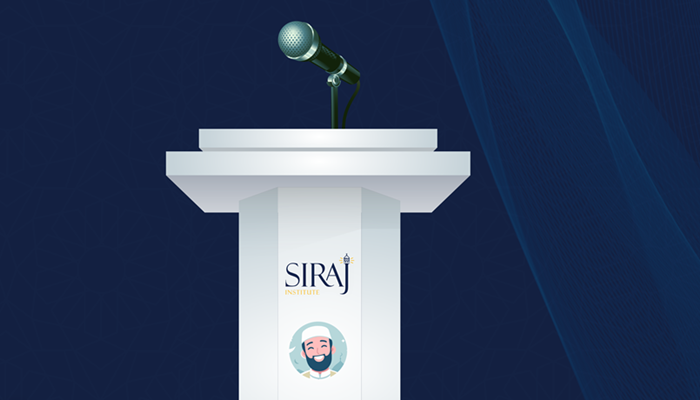
by Siraj Institute | Aug 8, 2024 | Article
As a community, we hold a profound responsibility to ensure that our children receive the best possible education, both academically and spiritually. Our teachers play a pivotal role in shaping the minds and hearts of the next generation. So, why is it that the teachers of the majority of Arabic and Quran weekend schools do not receive ANY training or professional development?
No parent would want the teacher of their children to be unqualified. Therefore, it is crucial that we take the development of our teachers seriously and provide them with the tools they need to succeed.
Why We Need to Improve Our Muslim Teachers
- Role Models for Our Youth: Teachers are not just baby sitters or Google bots for spitting information. They are both educators AND role models. They are expected to embody the values and principles of Islam, and their behavior and knowledge significantly influence their students – our children. By improving our teachers, we ensure that our children have positive role models to look up to.
- Quality Education: In a master’s study published by Al-Azhar University, it was found that over 72% of Quran teachers at mosques did not know how to properly teach the Quran; and a significant majority of them did not properly memorize the verses themselves! A well-trained teacher can deliver lessons more effectively, making learning engaging and meaningful. This leads to better understanding among students, and less stress among teachers.
- Spiritual Growth: Teachers who are well-versed in Islam can provide a deeper understanding of the faith, helping students to grow spiritually and develop a stronger connection with Allah.
- Community Strength: Educated and well-trained teachers contribute to the overall strength and unity of the community. They can address contemporary issues with wisdom and guide the youth in navigating the challenges of modern life.
Islamic Perspective on Education
The importance of education and the role of teachers is emphasized in both the Quran and Hadith. Allah says in the Quran:
“Are those who know equal to those who do not know?”
(Quran 39:9)
This verse highlights the value of knowledge and the distinction between those who are educated and those who are not.
Additionally, the Prophet Muhammad (peace be upon him) said:
“The best of you are those who learn the Quran and teach it.”
(Sahih Bukhari)
Many other Hadeeths put teachers and scholars in highest ranks of reward, and they all point to one thing: Caring and respecting our teachers is a duty upon the entire community.
Join Our Teacher Training Workshop
To support our teachers in their noble mission, we are offering a comprehensive Teacher Training Workshop end of August. Most weekend Islamic schools do not offer any training before the semester begins. This workshop is designed to equip Muslim educators with modern teaching techniques, enhance their understanding of Islamic principles in Education, and provide them with the resources they need to excel.
Register Today!
Invest in the future of our community by registering your teachers for our upcoming workshop. For more information and to register, please contact us at admissions [(at]) siraj [(dot]) institute or visit our teacher workshop page here.
Together, we can empower our teachers and ensure a brighter future for our children.
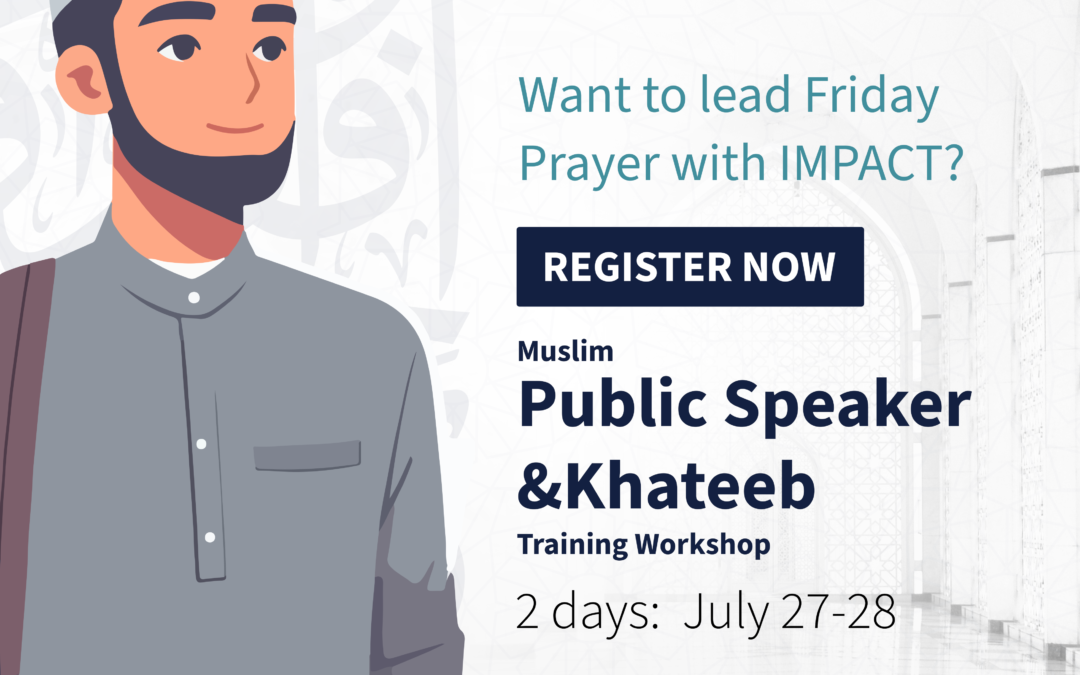
by Siraj Institute | Jul 12, 2024 | Article
You have an opportunity to learn from an introvert with stage fright, how he became an award-winning world-class public speaker. Would you miss it?
Our Muslim Public Speaking and Khateeb Workshop was designed to help you become a confident and effective speaker. This workshop, which is now being offered in its fifth time in ten years, is more wholesome and comprehensible than ever before. So, whether you’re a beginner Khateeb, a sister who leads a halaqa and is looking to refine her skills, or a community leader seeking to sharpen their public speaking skills, this workshop offers valuable insights and practical techniques to enhance your communication abilities. Don’t miss this opportunity to learn from experienced speakers and connect with like-minded individuals.
In this workshop, you’ll discover the secrets to engaging your audience, structuring your speeches, and delivering your message with clarity and confidence. Our expert trainers will guide you through interactive sessions, providing personalized feedback and support. You’ll also have the chance to practice your skills in a supportive environment, ensuring you leave with the tools and confidence to excel in any speaking situation.
`Register now to secure your spot in our Muslim Public Speaking Workshop! This is your chance to transform your public speaking abilities and make a positive impact in your community. Click here to sign up and take the right step towards becoming a powerful and inspiring speaker in your community.
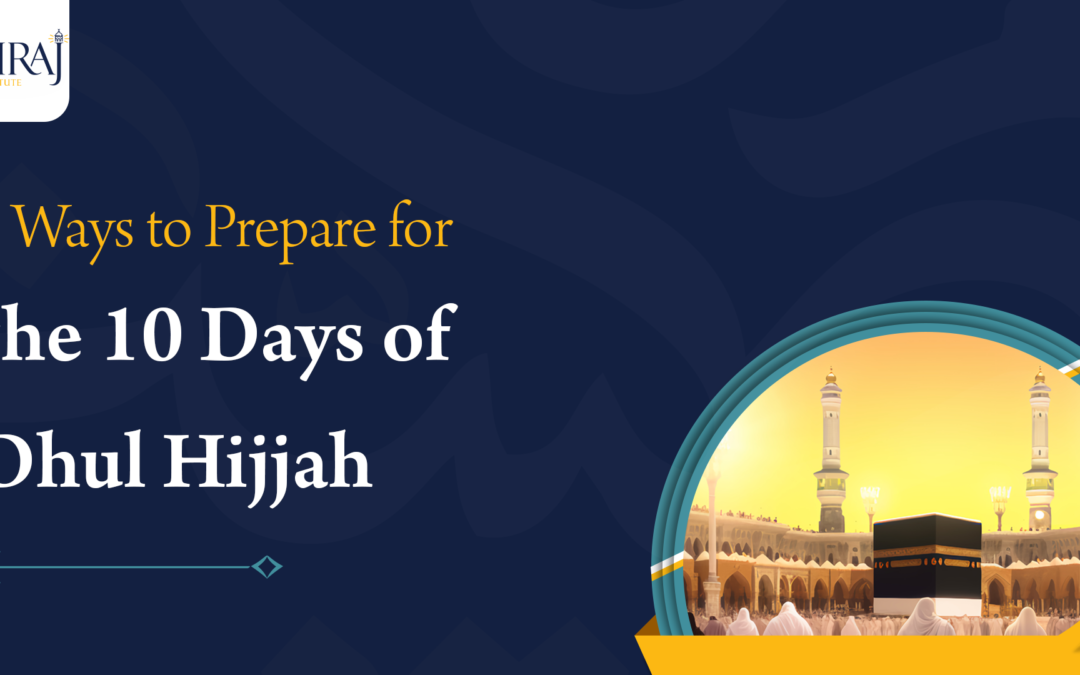
by Siraj Institute | May 30, 2024 | Article
Why not get ready for the best ten days of the year before they start? Just look at the prep work we do during Ramadan for the best ten nights! Somehow, we don’t treat these days the same, but we should. Here are 3 ways to prepare for the ten days of Dhul Hijjah.
1.Udhiyah or no Udhiyah?
If you are planning on making a sacrifice, then you imitate the state of those at Hajj in these ten days. Whoever is going to make a sacrifice does not cut his hair or his nails or anything from his skin. How long does he or she have to avoid this?
The whole ten days of Dhul Hijjah. Only when he or she has offered the sacrifice can the hair and nails be cut. Rasul Allah (peace and blessings be upon him) told us “When you see the new moon of Dhul Hijjah, if any one of you wants to offer a sacrifice, then he should stop cutting his hair and nails until he has offered his sacrifice.” (Sahih Muslim, 1977)
2.Simple Dhikr, Great Rewards
You know how we start off with regular charity in Ramadan and increase it in the end of the month? Let’s do that with our dhikr to prepare for Dhul Hijjah. We start off with simple remembrances of Allah today. Then once the 10 days begins, we build on this habit which multiplies in reward. Let’s start with this one:
Abu Huraira reported: The Messenger of Allah, peace and blessings be upon him, said, “Whoever declares one hundred times a day, ‘There is no God but Allah without any partner, to Him belongs sovereignty and all praise and He is powerful over everything,’ he will have the reward of emancipating ten slaves, a hundred good deeds will be recorded for him, a hundred sins will be erased from his record, and he will have a guard against Satan during the day until evening. No one will exceed him but one who recited these words more often.” (Sahih Bukhari 3293)
لَا إِلَهَ إِلَّا اللهُ وَحْدَهُ لَا شَرِيكَ لَهُ لَهُ الْمُلْكُ وَلَهُ الْحَمْدُ وَهُوَ عَلَى كُلِّ شَيْءٍ قَدِيرٌ
Just think of the rewards of saying this during these 10 days! The hadith literally tells us how to increase our rewards, because we can add to this 100 starting in Dhul Hijjah, but it will be more difficult if we aren’t already in the habit of saying it.
3.Sacred Month, Multiplied
Unlike during Ramadan, there are no extra angels helping us remember to do good deeds, and the shayateen are not locked up at all, making it more difficult to stay away from sins. To top it all off, Dhul Hijjah is a sacred month, so that means not only the reward of good deeds is multiplied; but the punishment for bad deeds is multiplied, too.
This means that we have to work hard to keep the devils at bay before Dhul Hijjah begins. Got family feuds? Work those out the best you can. Problems between people? Work to avoid causing harm to others and prevent harm being done. The sins of these actions will be multiplied once the month begins so now is the time to make peace between people and set yourself and family up for blessed 10 days.
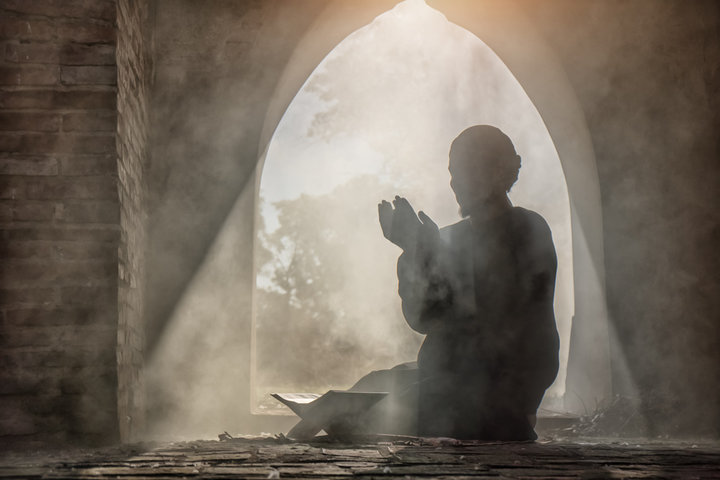
by Siraj Institute | May 4, 2024 | Article
This blog post reposted from Aboutislam.net by Dr. Ali Al-Halawani
Duaa is a great blessing and a divine gift from Allah the All-Merciful. He commanded us to make duaa and committed Himself to answer it for us.
{And your Lord says, “Call upon Me; I will respond to you.} (Ghafir 40:60)
Some say that duaa is the weapon of the faithful; meaning, it is very effective and decisive.
However, there are conditions that make your duaa more eligible for Allah’s response; the following verse mentions a few:
{And [mention] Zechariah, when he called to his Lord, “My Lord, do not leave me alone [with no heir], while you are the best of inheritors.”
So We responded to him, and We gave to him John, and amended for him his wife. Indeed, they used to hasten to good deeds and supplicate Us in hope and fear, and they were to Us humbly submissive.} (Al-Anbiya’ 21:89-90)
Why did Allah accept Zechariah’s duaa?
The answer to this question constitutes three points mentioned in the verse above. Let’s touch upon them one by one.
They used to hasten to good deeds
Hastening to good deeds was one of the traits of Zechariah (peace and blessings be upon him) and his household. The word ‘hasten’ reflects their quickness in doing what is good and acceptable.
Many of us are good people with pure hearts who like to do well; however, we are procrastinators who delay and put things off. But the Prophetic command is that we should hasten to good deeds and seize all opportunities before it is too late or before being occupied with other things.
They used to supplicate to Allah in hope and fear
Zechariah and his household were eager to supplicate to Allah, Glory be His, at all times, moments of joy, sadness, hope, or fear.
Abu Hurairah narrated:
The Messenger of Allah said: “Whoever wishes that Allah would respond to him during hardship and grief, then let him supplicate plentifully when at ease” (At-Tirmidhi and Al-Hakim –Al-Hakim deemed this hadith authentic).
They were humbly submissive to Allah
Submission is a state of the heart which is reflected on one’s limbs as well as actions.
Let’s get the most comprehensive definition of khushu` or submission from the Qur’an that says;
{And seek help through patience and prayer, and indeed, it is difficult except for the humbly submissive [to Allah ] Who are certain that they will meet their Lord and that they will return to Him.} (Al-Baqarah 2:45-46)
The Quran defines the humbly submissive to Allah as those who are certain to meet Him in the Hereafter and that they will return to Him after their demise.
Khushu represents any psychological state that leads its owner to observe piety, and recall fear of Allah at all times. Khushu is not just for prayer; it should be the trait of the faithful at all times and in all conditions.
All these characteristics show the type of life Prophet Zechariah led; He always acknowledged Allah. And in return, Allah, the Almighty never let him down. He fulfilled his wish, blessed him with a son, Yahiya (John), and amended his wife for him.
What do we mean by “acknowledge Allah”?
In a Prophetic hadith, the Prophet (peace and blessings be upon him) said,
“Be mindful of Allah, and you will find Him in front of you. Recognize and acknowledge Allah in times of ease and prosperity, and He will remember you in times of adversity” (40 Hadith of Nawawi 19).
To “acknowledge Allah” means you should try to please Him and draw nearer to Him, thank Him for His gifts and grace, be patient in times of affliction, and observe sincerity at all times be they good or bad.
This is what happened to the three people who sought shelter in a cave and because of their good deeds, Allah saved them by moving the huge rock that blocked the cave’s entrance.
Similarly, Allah tells us in the Qur’an about what happened to Prophet Jonah (Yunus) when he found himself in the belly of a whale.
{And had he not been of those who exalt Allah, He would have remained inside its belly until the Day they are resurrected.} (Al-Saffat 73:143-144)
Therefore, if you recognize Allah in times of prosperity and welfare, He will guide you through during the times of hardship and difficulty. That’s for sure!
This is unlike Pharaoh (Fir`aun) who denied Allah and denied faith in Him in times of ease. So, Allah did not save him when he was about to drown, even though he verbally declared his faith in Him. The Qur’an tells us;
{And We took the Children of Israel across the sea, and Pharaoh and his soldiers pursued them in tyranny and enmity until, when drowning overtook him, he said,
“I believe that there is no deity except that in whom the Children of Israel believe, and I am of the Muslims.”
Now? And you had disobeyed [Him] before and were of the corrupters?
So today We will save you in body that you may be to those who succeed you a sign. And indeed, many among the people, of Our signs, are heedless.} (Yunus 10:90-92)
The Quran tells us that Allah saved Pharaoh’s body to be a sign for those who succeeded him; meaning us. Sadly, many of us are heedless to these lessons despite them being very precise and clearly stated in the Quran!
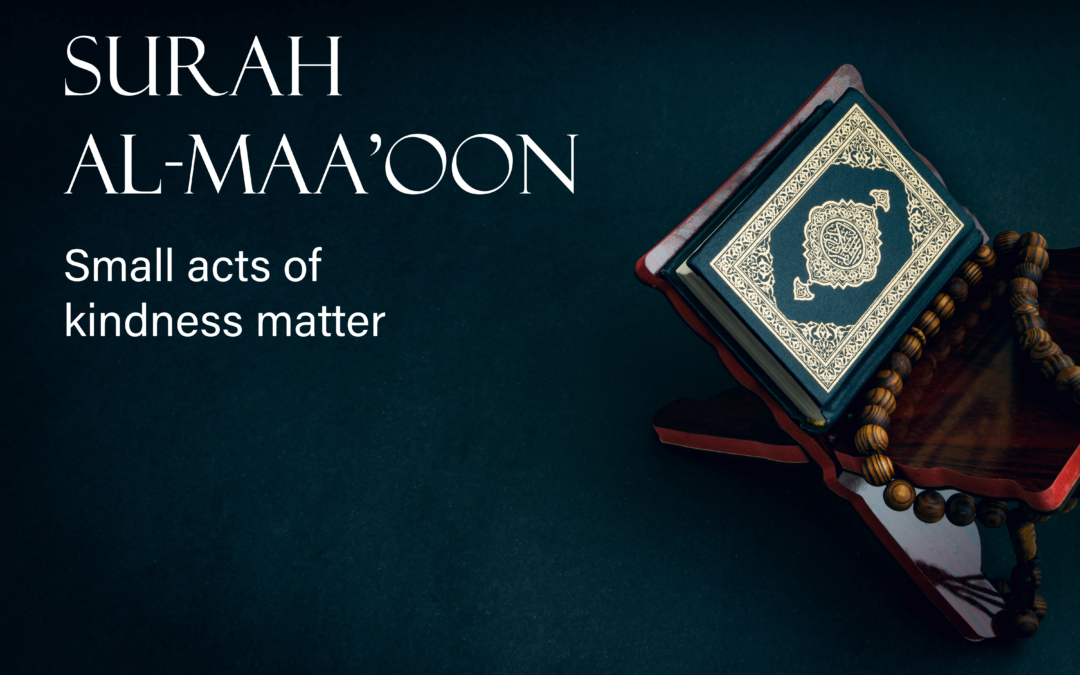
by Siraj Institute | Feb 6, 2024 | Article
This post is reposted with permission from the author Dr. Ali Al-Halawani and is found at AboutIslam.net
Some scholars say Surah Al-Ma`un was revealed in Makkah. Others say that only the first three ayahs of the surah were revealed there while the remaining ones were revealed in Madinah.
Though this last opinion seems to be most likely, the surah is cohesive and coherent as it has one main theme, that is, hypocrisy, insincerity, and pretension.
The overall theme of Surah Al-Ma`un
The religion of Islam is not a religion of appearances or meaningless rituals. Unless the acts of worship we are doing are characterized by perfect sincerity to Allah and also positively influencing the lives of others around us, Muslims and non-Muslims alike, these acts of worship are deemed null and void.
Why even do them if they do not impress the heart of the believer in a way that makes him want to perform good deeds and actions for the benefit of everyone
As the religion of Islam is complete and comprehensive, it is not acceptable to abide by some of its ordinances while neglecting others. This is explicitly referred to in Surah Al-Baqarah (2:85).
Likewise, as the Prophet was sent as a mercy to the world, the Shari`ah he brought is definitely a mercy to the whole world. That is why all acts of worship, both individual and collective, when combined together, create a condition of integration and mercy. This then affects and changes the lives of all human beings for the better.
There are signs that can prove whether we are true believers. Anyone can claim to be Muslim; they may even perform prayers and other rituals. However, this claim is proven through tangible actions and concrete deeds.
Surah Al-Ma`un presents us with a benchmark that identifies a real Muslim.
Key Terms
Ad-Din: This term stands for religion, faith, the Hereafter, or the final reward. This may mean that if one denounces any of these, he will be regarded as denying the religion in its entirety.
Sahun: This may refer to:
- hypocrites who pray in public but do not pray in private, or
- those who perform the prayer while they are mindless of it,
- or those who usually delay prayer until the end of its prescribed time,
- or those who perform the prayer outside of its prescribed time.
Consequently, whoever has any of the above characteristics, a portion of this ayah applies to him.
Al-Ma`un: Small tools and utensils people usually lend to each other, like an axe, a pot, a bucket, and the like.
But, who is the one who denies religion?
Surah Al-Ma`un starts with this question: “Have you seen him who denies religion?”
The most likely answer is the one who denounces faith and refuses to be a worshipper of God, or refuses to believe in the Hereafter.
To the reader’s surprise, the surah gives a totally unexpected answer:
“It is he who thrusts the orphan away,
Is this really the one who denies religion?!
Surely, he is, as the Qur’an states it clearly.
It depicts a portrait of a person who is hard on the orphan, treats him harshly as he pushes him away and snubs him.
Not only that. The one who denies religion is the one who “does not urge others to feed the needy.”
It is not enough for a Muslim to feed the needy and be generous to them. He should also encourage others to do good and be generous to the less fortunate..
One should do good and advise others to do good as well. Bringing happiness to society is both an individual as well as a collective duty. A true believer in God can never be inactive in any way.
In short, Allah does not want us to utter mere words that are void of any reality. He, Glory be His, wants us to walk the talk and be exemplary models of what we preach and say. Indeed, actions speak louder than words!
So, these three verses explain the reality of this faith in a very tangible and concrete way.
Low-Quality Prayers
Surah Al-Ma`un also introduces us to another example of that reality. It’s the ones who perform the prayers but at the same time they are careless of their prayers.
They use their prayers as a way to show off. They try to put on the cloak of piety to deceive others all the while their hearts are distracted or negligent.
Small Deeds Are Important
Furthermore, the ones who deny religion, also fail the practical test of being helpful and useful to their fellow members of society. They “refuse to give even the smallest help to others“, which is described in the Surah as al-Ma`un.
If you are a true believer in Allah, and your prayer has a real impact on your heart, this impact should appear in your actions.
You should use what Allah bestowed upon you to benefit others and make their lives easier.
You were given tools and things as a test whether you would help others, which is an obligation on you.
A final word
A line should be drawn between showing off and being pleased with one’s obedience to Allah. Showing off is to do good deeds only to be seen by others. But if one does a deed sincerely for Allah’s sake, and people come to know about it, then this is not considered showing off.
To conclude, Allah the Almighty does not need anything from His creation. Instead, He gives us all that can make our lives happy and enriched. He wants us to lead a life that is full of integration, love, fraternity, mutual understanding, and good conduct.
The people described in the Surah are those who do not worship their Lord well, nor do they treat His creation well.
Never be one of these!






